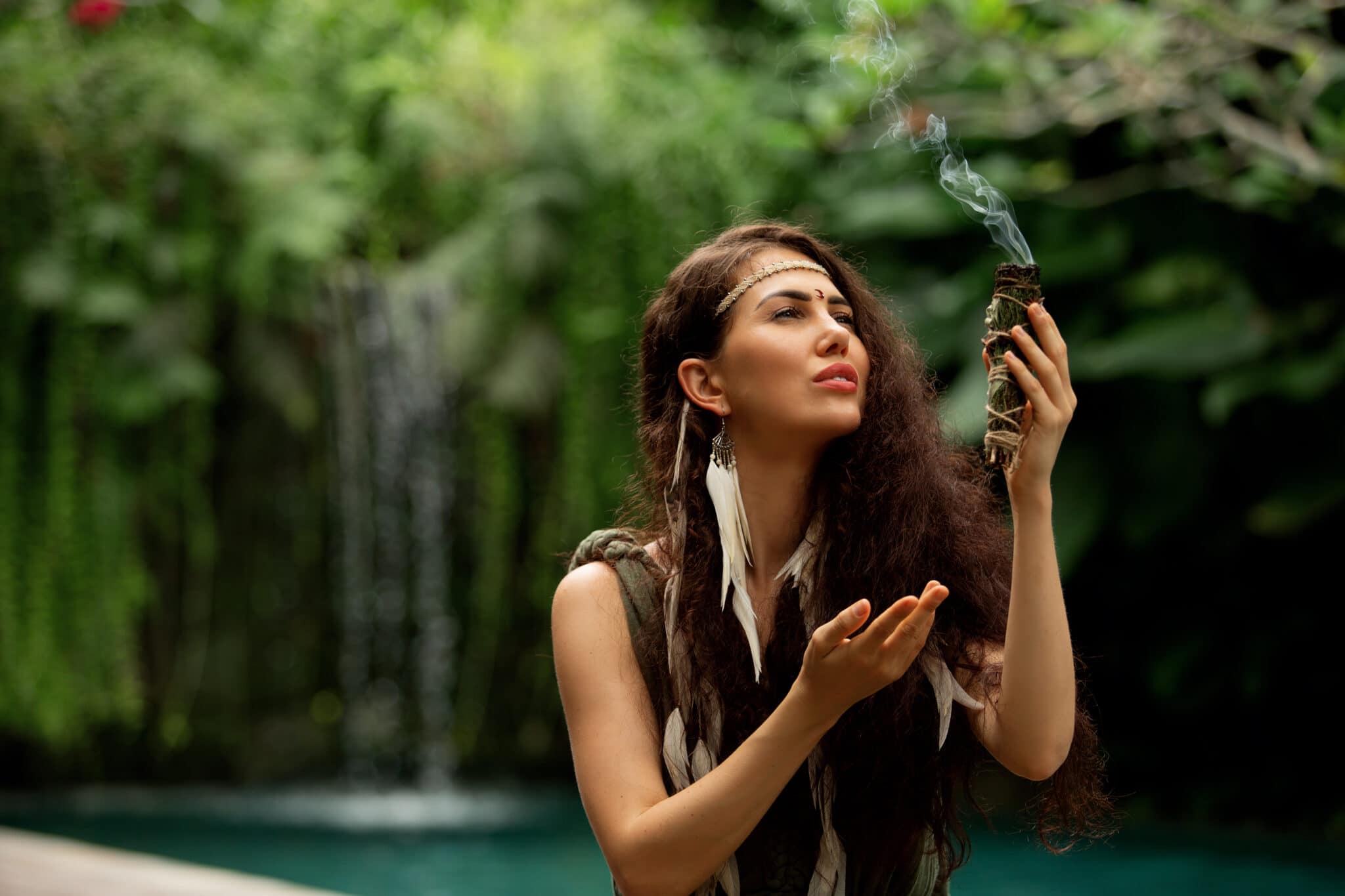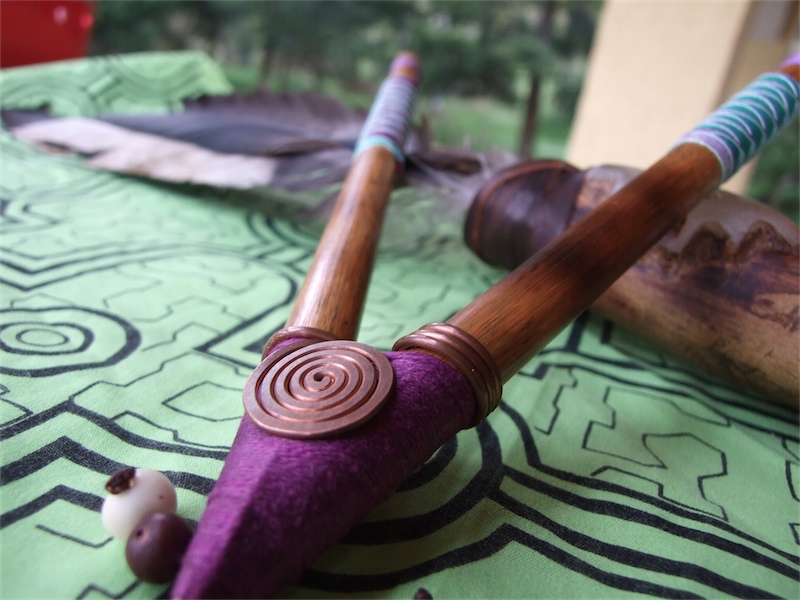
Shamanism – who is a shaman and what does he want to tell us?
In the Western world, November prompts us to reflect on our dead ancestors. In the shamanic tradition they are not only people, but also animals, plants, and even microorganisms. Moreover, our fate is also shaped by those who will be born in the future.
Shamans and contact with the ancestors
From the shamanic perspective, our ancestors are not just people. Scientists have a similar position, for just as we share the planet with numerous animals, plants, fungi and other creatures, the genes and cells of the human body are related to the cells of the first living beings. Recent discoveries point to microbes that lived about 3.5 billion years ago. But that’s not all. In 2017, scientists measured the distribution of elements from more than 150,000 stars located in the Milky Way Galaxy. It turned out that 97 percent of our body is composed of the same components as stardust. So the Cornell University astronomy and space science professor was probably right when he said that we are stardust that thinks about stars.
Shamanism recognizes our present lives as directly dependent not only on ancestors and ancestresses, but also on descendants and descendants. Each and every one of us is between those who have prepared the ground for us and those who are already coming. Both those in human bodies and those new bodies that the mind cannot imagine. Life endures, it has dealt with all earthly catastrophes, and it will deal with impending crises; perhaps, as has happened more than once in the past, it will change form, but it will survive. Of course, this process takes longer than one human life, but one life also matters. To feel the momentousness of the present moment, all it takes is a little relaxation and contemplation – a recognition of the life that is happening for you now with every inhalation and exhalation.
In the circle of life
Recognizing for yourself your place in the circle of life can prompt two feelings. First, gratitude to your ancestors – whatever they may have been – solely for passing on life. Second to a desire to prepare the best possible world for those who are coming. And they, like us, will have their time – keeping this in mind during our daily choices and decisions helps us understand that no home is exclusively ours. Or to put it another way: we have one home, shared by all living beings, and that is the Earth.
Whatever you think about it, we are related to all humans, but also to eagles, wild boars, oak trees – which can live a thousand years – moss, seaweed, seahorses or extinct dinosaurs, mountains and the ocean. We did not come from nowhere, and even if we give our body to the earth or to fire, the elements that made up that body will not disappear. They will remain the building blocks of new life, which in a moment of awe will perhaps recognize its ancestors and its ancestors’ ancestors. Just as you do now.
Shamans believe in healing relationships with ancestors
According to Malidoma Patrice Somé, a shaman from the Dagar tribe in Burkina Faso, unregulated relationships with ancestors are responsible for the anxiety modern humans feel. “In many non-Western cultures, ancestral spirits remain in close contact with the world of the living. They are always available to show the living the way, to instruct them, to offer protection. They form one of the bridges between the knowledge of this world and the wisdom of the hereafter. If there is no balance in the relations between the living and the dead, chaos ensues,” he writes in his book “Of Water and Spirit. Rituals, magic and initiation in the life of an African shaman”. Malidoma tells the story of the path that led him to shamanism. As a young boy he was sent to a school run by missionaries and for a long time he was cut off from his culture, language and loved ones. When he returned to his tribe a dozen years later, an initiation awaited him, a reunion with his ancestors, a re-learning of the language of those who do not use words: plants, animals, spirits.
“Looking from the perspective of their culture to the descendants of Western colonizers, the Dagars see a people who are ashamed of their ancestors because they were plunderers and murderers hiding under the masks of saviors. It is not surprising that the culture these people come from is sick. The Dagars believe that it is the duty of the living to heal their ancestors. If this does not happen, the unhealthy energy of the ancestors will haunt the souls and minds of those who should be helping them,” – he explains.
Not all Westerners are cutting themselves off from their roots. Many embrace the challenge, understanding that it’s not just about healing the past, but also about gaining a cure, reclaiming a lost part of themselves and power – all of which ancestors and ancestral energy can help with.
Shamanism and spiritual encounter
The first step in a healthy relationship with your ancestors is to acknowledge them. It seems simple, but at a deep level many people rush through life, dreaming their dream of independence – not only from all living beings on Earth, but also from those who have gone before us. There were certainly criminals and cruel people among them, but there were probably also doctors, healers, gardeners, seamstresses, good people who bowed down to life, looked after their children, talked to the earth and listened to the sound of a murmuring stream.
This listening was a form of homage and understanding that the stream was alive, as evidenced by the trout and cold water that could be drawn with the hands and drank. Today, more and more people tired of the anxiety and pandemic squeeze are beginning to listen again, not only to the streams, but also to the wind or even the silence that wild nature brings. Some seek answers in shamanic rituals in which the tribe, elders, and ancestors play a key role – with the understanding that they include not only the oldest people but also the four elements: fire, water, air, and earth. Once the first step was made – the ancestors and the ancestral people were recognized – something else had to happen and it was healing. Namely, the recognition of the life that is given to me. It is a brief moment devoid of mind stories, complaints and good advice. It has no room for spinning stories about what this life is like. Even if it is filled with pain and drudgery, it certainly contains a host of other experiences and opportunities. And as in every life there is hope inscribed in it – not only for healing of the body, psyche and spirit, but also for helping those who went astray many, many years ago. And encounters with them through the medium of spirit – birdsong, the silvery bark of an oak tree, a burning fire, the salt water of a vast sea full of life.
Modern psychology will perhaps say of the subconscious, the Dagars call it a bond with the ancestors, or rather with the spirits of the ancestors.
Shamanism and Water Genealogy
The next challenging step is to recognize the work that each of us can do – not only for our own benefit, but also for the benefit of all other living beings. And again, knowing who our relatives are can help with this. For while we take for granted the dependence of our life and health on water, few see the life in it. The water that is the main building block of our bodies. The one that for millions of years has circulated between clouds, rain, underground rivers, geysers. The same one that all our ancestors drank.
Awareness of the web of life encourages us not to damage it, or at least limit the damage. One can also find a crack in the web of life and patch it up. Perhaps for someone it will be giving up an addiction out of respect for a body full of water. For someone else, it may be a decision to leave an unmowed, untrampled space next to their home that will benefit our animal brothers and sisters. Some will make an active effort to speak out, to defend the powerless, to stop the machinery that destroys life. There are those who will hear the songs of their ancestors and forebears and try to forgive them for their mistakes and not reenact hurtful stories and decisions – and those have almost always involved not recognizing other beings, humanic…

